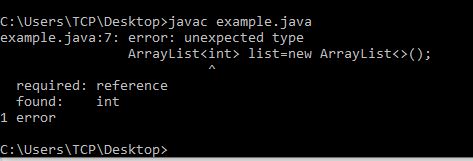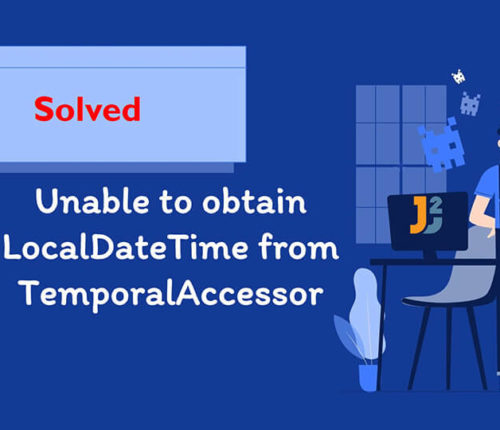I’m a newbie to Java.
I have provided a short snippet from my code for BFS.
public int bfs(Person p, Person q) {
private HashMap<Person, boolean> marked;
private int count;
marked = new marked<Person, boolean>();
count = new int;
}
According to Eclipse, I have an error on each of the last 4 lines.
Syntax Error: insert «Dimensions» to complete expression/referencetype.
I would appreciate any input/advice!
MC Emperor
21.9k14 gold badges80 silver badges127 bronze badges
asked Jan 19, 2016 at 19:34
2
Cause of this error -You are trying to pass a primitive object into a generic type declaration whereas generic types always expect a Wrapper Class object. So please use ‘Boolean’ instead of ‘boolean’ in your code i.e. ‘B’ in caps.
answered Sep 2, 2017 at 19:35
3
You need to use the wrapper object not the primitive. Use Boolean instead of boolean.
answered Jul 19, 2017 at 9:16
Satyendra Sharma’s answer is absolutely correct, but here’s some reasoning of what exactly the error message is saying.
The error is caused by using a primitive type, which cannot be used as a generic type argument. For instance, List<boolean> is incorrect, whereas List<Boolean> is correct. Wrapper classes can be used to wrap the primitive values and yield a reference type, which can be used with generics.
Insert dimensions? What?
The message «Insert dimensions to complete expression/referenceType» is probably because in order for the expression to become valid, the only valid token here is a set of square brackets.
For instance,
HashMap<Person, boolean[]> marked;
will just compile fine. This is because, unlike a boolean, a boolean[] is an object.
answered Sep 28, 2020 at 12:28
MC EmperorMC Emperor
21.9k14 gold badges80 silver badges127 bronze badges
Generic are resolved during compile time and during runtime their no context about the generic used in your code. The Object is than type cast into the class type provided against the generic type. Now both primitive and object are completely unrelated entities in java. Direct time-cast of Object to primitive type isn’t possible in java. For this reason the use of primitive type in generic is disallowed and eclipse gives this warning.
answered Jun 20, 2018 at 8:56
It seems that this snippet is throwing around random keywords without any understanding — I would suggest a Java tutorial. First of all, generics are one of the main uses for boxing. boolean or any other primitives (you can recognise these by the fact that their identifiers are in lower-case and most IDEs will highlight them) cannot be used as a generic type, and their capitalised equivalent must be used (a simple wrapper class). Here, use HashMap<Person, Boolean>.
I’m not sure what is meant by marked = new marked... — clearly, marked is not a type and cannot be used in this context. new x(params) initialises an object of type x, passing its constructor params. new x<generics>(params) is the same but the generic type(s) of x are generics.
Finally, new int is not at all valid — see my explanation above. Primitives are not objects, which means initialising them is meaningless and therefore invalid. Also, what do you expect this expression to yield? Something of type int, but you are not specifying which int. The correct syntax is a literal: count = x; where x is some integer within the range of int.
As a side note, your method has an unclear name and variables may be initialised in the same line you declare them to simplify code.
answered Jan 19, 2016 at 19:57
bcsb1001bcsb1001
2,8023 gold badges24 silver badges35 bronze badges
0
Visit Cannot Instantiate Generic Types with Primitive Types
Replace all type parameters in generic types with their bounds or Object if the type parameters are unbounded. The produced bytecode, therefore, contains only ordinary classes, interfaces, and methods.
The type parameter, V, actually also K, which is declared in HashMap<K,V>, will be replaced with Object after erasing, because they are unbounded. While primitive type can not be store as Object.
answered Jan 29, 2019 at 14:07
A quick guide for fixing java compile-time error «Syntax error, insert «Dimensions» to complete ReferenceType».
1. Overview
In this tutorial, We’ll learn how to fix the common compile time error «Syntax error, insert «Dimensions» to complete ReferenceType» in java.
This error occurs when you are working with the java generic types.
It is suggested to follow the generic naming conventions and rules with collection api.
Compile time error
Syntax error, insert «Dimensions» to complete ReferenceType.
At the end of the article, we’ve given GitHub link for the examples shown in this post.
2. Java Insert Dimensions To Complete Referencetype Example and Fix
A simple example on insert dimensions to complete reference type and how to simulate this error.
A note is to remember that you are working with the raw generic types along with the wrapper objects and primitive values.
Example 1
package com.javaprogramto.collections.generics;
import java.util.ArrayList;
import java.util.List;
public class GenericsCompileTimeError {
public static void main(String[] args) {
List<Integer> integers = null;
integers = new ArrayList<int>();
}
}
Compile time error
Exception in thread "main" java.lang.Error: Unresolved compilation problem: Syntax error, insert "Dimensions" to complete ReferenceType at com.javaprogramto.collections.generics.GenericsCompileTimeError.main(GenericsCompileTimeError.java:12)
Here, List reference is declared as Integer wrapper type but when initializing ArrayList, we have passed the int which is a primitive data type.
So, here data type mismatch between the generic declaration and initialization.
To fix this syntax error, we need to replace the primitive int with Wrapper class Integer.
Example to fix the above syntax error
import java.util.ArrayList;
import java.util.List;
public class GenericsCompileTimeErrorFix {
public static void main(String[] args) {
List<Integer> integers = null;
integers = new ArrayList<Integer>();
integers.add(100);
}
}
There is no compile time error now. If you are using eclipse, you do see the instant result because eclipse does the auto compile.
We’ve shown in the declaration but this can be seen in the method type argument.
3. Another Example on Insert Dimensions To Complete Referencetype and Fix
Example 2
package com.javaprogramto.collections.generics;
import java.util.Map;
import java.util.TreeMap;
import com.javaprogramto.models.Employee;
public class GenericsCompileTimeError2 {
public static void main(String[] args) {
Map<Employee, Boolean> integers = null;
integers = new TreeMap<Employee, boolean>();
}
}
Error
Exception in thread "main" java.lang.Error: Unresolved compilation problem: Syntax error, insert "Dimensions" to complete ReferenceType at com.javaprogramto.collections.generics.GenericsCompileTimeError2.main(GenericsCompileTimeError2.java:14)
Fix
To fix this error, you need to replace boolean with Boolean wrapper class as below.
package com.javaprogramto.collections.generics;
import java.util.Map;
import java.util.TreeMap;
import com.javaprogramto.models.Employee;
public class GenericsCompileTimeError2Fix {
public static void main(String[] args) {
Map<Employee, Boolean> emps = null;
integers = new TreeMap<Employee, Boolean>();
}
}
This code produces no compile-time errors.
4. Conclusion
In this article, we’ve seen how to fix generic Syntax errors, insert «Dimensions» to complete ReferenceType in java with examples.
To fix the error, we have to use the wrapper class in place of primitive type in collection classes declarations and initialization.
GitHub
Java Generics
Java type inference in Generics
We usually get this error in java when we are trying to pass primitive data type in the generic type declaration. The reason we get this error because generic always expects the wrapper classes but gets the primitive data type.
Those who are unaware about primitive data types and wrapper classes.
Wrapper Classes
Wrapper classes are classes in java which contains primitive data types and primitive data type can be used as objects by the help of wrapper class. Wrapper classes contained by java.util.package in Java. With autoboxing a primitive data type is converted into corresponding object and with unboxing a wrapper class is converted into corresponding primitive data type.
Given below is the list of wrapper classes in Java:
- Byte
- Character
- Short
- Long
- Integer
- Double
- Float
- Boolean
Primitive Data Types
These are the most basic data types in Java which is predefined by language and having a fixed keyword for each of them. There are eight primitive data types in Java which are given below:
- byte
- char
- short
- long
- int
- double
- float
- boolean
Here are some examples with this you can fix the error:
|
package introduction; import java.util.*; public class example { public static void main(String[] args) { ArrayList<int> list=new ArrayList<>(); list.add(25.0); list.add(57.5); System.out.println(list); } } |
Output:
Exception in thread “main” java.lang.Error: Unresolved compilation problem:
Syntax error, insert “Dimensions” to complete ReferenceType
at MyProject/introduction.example.main(example.java:7
In the above example we are passing “int” which is primitive data type. We can fix this by replacing it with corresponding wrapper class “Integer”.
|
package introduction; import java.util.*; public class example { public static void main(String[] args) { ArrayList<Integer> list=new ArrayList<>(); list.add(25); list.add(57); System.out.println(list); } } |
You can see now error has been fixed and we are getting our expected output.
Output:
[25, 57]
Similar steps can be followed for double and rest of the primitive data types.
|
package introduction; import java.util.*; public class example { public static void main(String[] args) { ArrayList<double> list=new ArrayList<>(); list.add(25.0); list.add(57.5); System.out.println(list); } } |
Output:
Exception in thread “main” java.lang.Error: Unresolved compilation problem:
Syntax error, insert “Dimensions” to complete ReferenceType
at MyProject/introduction.example.main(example.java:7
We will replace the “double” with “Double” which is corresponding wrapper class for this.
|
package introduction; import java.util.*; public class example { public static void main(String[] args) { ArrayList<Double> list=new ArrayList<>(); list.add(25.0); list.add(57.5); System.out.println(list); } } |
Now error has been successfully fixed for “double” also and we are getting our output.
Output:
[25.0, 57.5]
I hope this guide will help you to solve the error. Comment down below if you still have any queries.
Содержание
- [Fixed] insert dimensions to complete referencetype
- Was this post helpful?
- Share this
- report this ad Related Posts
- Author
- Related Posts
- [Fixed] Unsupported class file major version 61 in Java
- [Fixed] java.lang.ClassCastException: java.util.Arrays$ArrayList cannot be cast to java.util.ArrayList
- [Fixed] java.util.HashMap$Values cannot be cast to class java.util.List
- [Fixed] Unable to obtain LocalDateTime from TemporalAccessor
- Solve Error insert “Dimensions” to complete ReferenceType in Java
- Wrapper Classes
- Primitive Data Types
- Solve Error insert “Dimensions” to complete ReferenceType
- Get ArrayList of Int Array in Java
- Creating ArrayList of Int Type
- Adding Integer Element to an Index in ArrayList
- Accessing ArrayList Element With the Index
- ArrayList of Int Arrays
- Accessing Int Array Element From ArrayList
- ArrayList of ArrayLists
- Summary
[Fixed] insert dimensions to complete referencetype
In this post, we will see about error insert dimensions to complete referencetype .
You will get this error when you are trying to pass primitive objects into generic type declaration but generic always expect a Wrapper class in java.
For example:
Let’s say you have the below class named InsertDimensionlMain.java .
Above code won’t compile, you will a compilation error with «insert dimensions to complete referencetype».
You can solve this issue by replacing int by its wrapper class Integer in Map declaration.
Let’s see another example with ArrayList.
Here also we will get same issue.
You can solve this issue by replacing double by its wrapper class Double .
That’s all about how to resolve insert dimensions to complete referencetype in java.
Was this post helpful?
[Fixed] no main manifest attribute
[Fixed] no suitable driver found for jdbc
[Fixed] Unsupported class file major version 61 in Java
Table of ContentsReason for Unsupported class file major version 61 in JavaSolution for Unsupported class file major version 61 in JavaAndorid studio/Intellij Idea with gradleAny other scenario In this post, we will see how to fix Unsupported class file major version 61 in Java. Reason for Unsupported class file major version 61 in Java You […]
[Fixed] java.lang.ClassCastException: java.util.Arrays$ArrayList cannot be cast to java.util.ArrayList
Table of ContentsReason for java.lang.ClassCastException: java.util.Arrays$ArrayList cannot be cast to java.util.ArrayListFixes for java.lang.ClassCastException: java.util.Arrays$ArrayList cannot be cast to java.util.ArrayListUse ArrayList’s constructorAssign Arrays.asList() to List reference rather than ArrayList In this post, we will see how to fix java.lang.ClassCastException: java.util.Arrays$ArrayList cannot be cast to java.util.ArrayList. ClassCastException is runtime exception which indicate that code has tried to […]
[Fixed] java.util.HashMap$Values cannot be cast to class java.util.List
Table of ContentsWhy HashMap values cannot be cast to list?Fix for java.util.HashMap$Values cannot be cast to class java.util.List In this post, we will see how to fix error java.util.HashMap$Values cannot be cast to class java.util.List. Why HashMap values cannot be cast to list? HashMap values returns java.util.Collection and you can not cast Collection to List […]
[Fixed] Unable to obtain LocalDateTime from TemporalAccessor
Table of ContentsUnable to obtain LocalDateTime from TemporalAccessor : ReasonUnable to obtain LocalDateTime from TemporalAccessor : FixLocalDate’s parse() method with atStartOfDay()Use LocalDate instead of LocalDateTime In this article, we will see how to fix Unable to obtain LocalDateTime from TemporalAccessor in Java 8. Unable to obtain LocalDateTime from TemporalAccessor : Reason You will generally get […]
Источник
Solve Error insert “Dimensions” to complete ReferenceType in Java
We usually get this error in java when we are trying to pass primitive data type in the generic type declaration. The reason we get this error because generic always expects the wrapper classes but gets the primitive data type.
Those who are unaware about primitive data types and wrapper classes.
Wrapper Classes
Wrapper classes are classes in java which contains primitive data types and primitive data type can be used as objects by the help of wrapper class. Wrapper classes contained by java.util.package in Java. With autoboxing a primitive data type is converted into corresponding object and with unboxing a wrapper class is converted into corresponding primitive data type.
Given below is the list of wrapper classes in Java:
- Byte
- Character
- Short
- Long
- Integer
- Double
- Float
- Boolean
Primitive Data Types
These are the most basic data types in Java which is predefined by language and having a fixed keyword for each of them. There are eight primitive data types in Java which are given below:
- byte
- char
- short
- long
- int
- double
- float
- boolean
Solve Error insert “Dimensions” to complete ReferenceType
Here are some examples with this you can fix the error:
Источник
Get ArrayList of Int Array in Java
This tutorial introduces how to get ArrayList of ints in Java and lists some example codes to understand the topic.
An ArrayList is a dynamic or resizable array. It is part of the Collection Framework in Java. ArrayList is used to overcome the problem of the fixed size of normal arrays. In this tutorial, we will learn how to create ArrayList of ints.
Creating ArrayList of Int Type
ArrayList or any other collection cannot store primitive data types such as int. If we write the code shown below, then we will get a compilation error.
Instead, we use wrapper classes to store primitives in ArrayList . Each primitive data type has a corresponding wrapper class that represents an object for the same type. For int data type, the wrapper class is called Integer . So, to create an ArrayList of ints, we need to use the Integer wrapper class as its type.
We can now add integers to the ArrayList by using the class’s add() method.
ArrayList , just like normal arrays, follow zero-based indexing. We can specify the index where we want to add an object in the add() method. The element present at that index and all elements to its right will shift one place to the right.
Adding Integer Element to an Index in ArrayList
Accessing ArrayList Element With the Index
We can fetch individual ArrayList items by using their indices. Pass the index value to the get() method to fetch the required element.
We can also print the entire ArrayList by using a single print statement.
ArrayList of Int Arrays
We can create an ArrayList where each element itself is an array. We use the data type and square brackets to create a new array.
Similarly, we defined the type of the ArrayList by using int[] . We cannot use primitives like int as ArrayList type, but we can use int[] . This is because arrays in Java are objects, not primitives. And an ArrayList can be created by any object type(arrays in our case).
We can perform all the basic operations we discussed above. We need to use the toString() method of Arrays to properly print the array to the console.
Accessing Int Array Element From ArrayList
We can also access the individual elements of the int arrays present in the ArrayList . We will use array indices to do this. For example, if we wish to access the second element of the third array, then we will use the following code:
However, we need additional code to print the entire ArrayList of arrays.
ArrayList of ArrayLists
As discussed above, arrays are of fixed length, but ArrayLists are dynamic. Instead of creating an ArrayList of int arrays, we can create an ArrayList of Integer ArrayLists . This way, we won’t need to worry about running out of space in our array.
We can use the add() method and the get() method just like before. However, we require a loop to print each ArrayList element.
If you wish to access individual elements of the ArrayList , then use the get() method twice. For example, if you want the second element of the third ArrayList , then use:
Summary
ArrayList is probably the most commonly used Collection in Java. It is a simple data structure used to store elements of the same type. We cannot create an ArrayList of primitive types like int. We need to use the wrapper classes of these primitives. The ArrayList class provides convenient methods to add and fetch elements from the list. We can also create an ArrayList of arrays or an ArrayList of ArrayLists . They are mostly used to represent data in a 2D matrix format or a tabular format. It is better to use an ArrayList of ArrayLists , as it won’t limit its size.
Источник
This tutorial explains the concept of Method References introduced in Java 8. It first defines method references and explains its syntax. Next it looks at the 3 types of method references and explains each of them with code examples.
Definition: A method reference is a simplified form (or short-hand) of a lambda expression Click to REad Tutorial on Lambda Expressions . It specifies the class name or the instance name followed by the method name. Instead of writing the lambda expression with all the details such as parameter and return type, a method reference lets you create a lambda expression from an existing method implementation.
Method Reference Syntax: ::
Method Reference Example
Integer::parseInt is a method reference with the following charecteristics –
- It is equivalent to the lambda –
(String str, Integer integer)->Integer.parseInt(str) - It can can be assigned to a functional interface Click to Read Tutorial on Functional Interfaces Function like this –
Function intParser=Integer::parseInt - Above assignment is equivalent to the assignment of lambda expression of parseInt() –
Function intParser =
(String str,Integer integer)->Integer.parseInt(str)
Thus, instead of the longer lambda expression, just its concise method reference can be assigned to a functional interface instance.
Types of Method References
Type 1: Reference to a static method – If we intend to use a static method of a class then instead of writing the lengthier lambda expresion we can just refer to the method via method references.
Lambda Syntax: (arguments) -> . (arguments);
Equivalent Method Reference: ::
Let us now see an example showing the usage of method reference for a static method –
Type 2: Reference to an instance method of a particular object –
Lambda Syntax: (param, rest of params)-> (param).
Источник
In this post, we will fix the error insert dimensions to complete referencetype. This error is a compile-time error. The root cause of this error is that you are passing a primitive data type(int, float, boolean, etc. ) into a generic type declaration but generic types always expect a Wrapper class object(Integer, Float, Boolean, etc.).
Read Also: resource is out of sync with the filesystem error in eclipse
As always, we will produce the error first before moving on to the solution.
Fixed: insert dimensions to complete referencetype
1. Below code will give a compilation error in eclipse:
import java.util.*; public class InsertDimensionsError { public static void main(String[] args) {Map<String, int> map;
} }
Output:
Explanation
In the above code, we are passing primitive data type ‘int’ instead of the wrapper class. We can fix this error by replacing it with the corresponding wrapper class i.e Integer.
Solution:
import java.util.*; public class InsertDimensionsError { public static void main(String[] args) {Map<String, Integer> map;
} }
2. Another example of insert dimensions to complete referencetype error is:
import java.util.*; public class InsertDimensionsError2 { public static void main(String[] args) {List<double> listObj = new ArrayList<>();
listObj.add(15.0); listObj.add(30.0); System.out.println(listObj); } }
Output:
Explanation
In the above example, we are passing primitive data type ‘double‘ instead of the wrapper class. We can fix this error by replacing it with the corresponding wrapper class i.e Double as shown below:
Solution:
import java.util.*; public class InsertDimensionsError2 { public static void main(String[] args) {List<Double> listObj = new ArrayList<>();
listObj.add(15.0); listObj.add(30.0); System.out.println(listObj); } }
Output:
[15.0,30.0]
That’s all for today, please mention in the comments in case you have any questions related to insert dimensions to complete referencetype.

![Java Insert Dimensions To Complete Referencetype [Fixed] Java Insert Dimensions To Complete Referencetype [Fixed]](https://blogger.googleusercontent.com/img/a/AVvXsEi4G2by9JuxmRIQis7st5PGCNkR58JgE92J3-YtkewqmcyhzwXXfePxkg1ldJqwrxgfZyruN1QY-zJIn5SpeplmFC5tOhXE7vrm0EdSPktIt9Ry2uJXNskFUK-EXZkYHEoHrfga3P9ZFLvU4-5MXSLbxkEd8H8_iGAQxMmwCg5GaDJVDUg56MJb2xKA=w400-h255)








